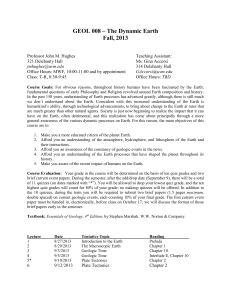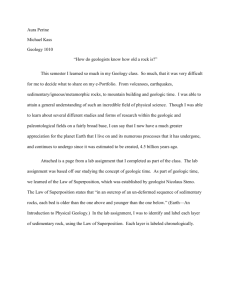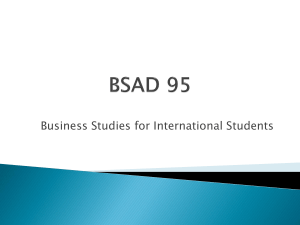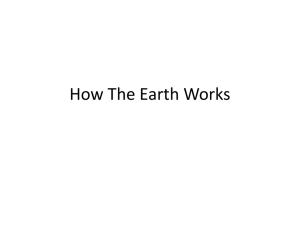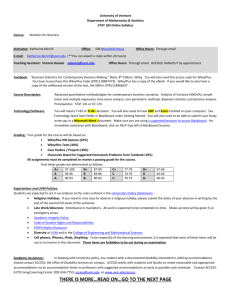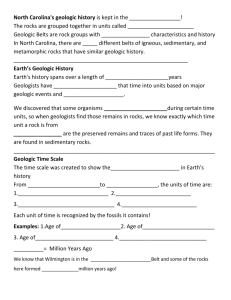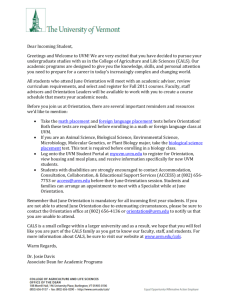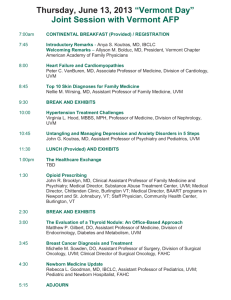Geology 008 - University of Vermont
advertisement
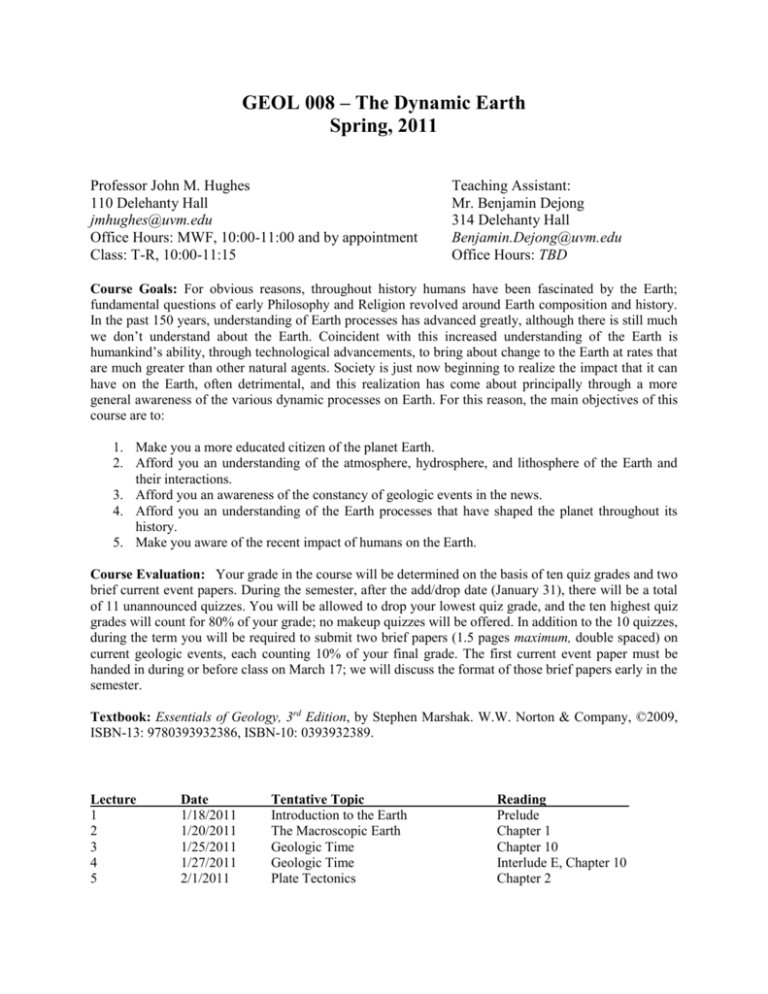
GEOL 008 – The Dynamic Earth Spring, 2011 Professor John M. Hughes 110 Delehanty Hall jmhughes@uvm.edu Office Hours: MWF, 10:00-11:00 and by appointment Class: T-R, 10:00-11:15 Teaching Assistant: Mr. Benjamin Dejong 314 Delehanty Hall Benjamin.Dejong@uvm.edu Office Hours: TBD Course Goals: For obvious reasons, throughout history humans have been fascinated by the Earth; fundamental questions of early Philosophy and Religion revolved around Earth composition and history. In the past 150 years, understanding of Earth processes has advanced greatly, although there is still much we don’t understand about the Earth. Coincident with this increased understanding of the Earth is humankind’s ability, through technological advancements, to bring about change to the Earth at rates that are much greater than other natural agents. Society is just now beginning to realize the impact that it can have on the Earth, often detrimental, and this realization has come about principally through a more general awareness of the various dynamic processes on Earth. For this reason, the main objectives of this course are to: 1. Make you a more educated citizen of the planet Earth. 2. Afford you an understanding of the atmosphere, hydrosphere, and lithosphere of the Earth and their interactions. 3. Afford you an awareness of the constancy of geologic events in the news. 4. Afford you an understanding of the Earth processes that have shaped the planet throughout its history. 5. Make you aware of the recent impact of humans on the Earth. Course Evaluation: Your grade in the course will be determined on the basis of ten quiz grades and two brief current event papers. During the semester, after the add/drop date (January 31), there will be a total of 11 unannounced quizzes. You will be allowed to drop your lowest quiz grade, and the ten highest quiz grades will count for 80% of your grade; no makeup quizzes will be offered. In addition to the 10 quizzes, during the term you will be required to submit two brief papers (1.5 pages maximum, double spaced) on current geologic events, each counting 10% of your final grade. The first current event paper must be handed in during or before class on March 17; we will discuss the format of those brief papers early in the semester. Textbook: Essentials of Geology, 3rd Edition, by Stephen Marshak. W.W. Norton & Company, ©2009, ISBN-13: 9780393932386, ISBN-10: 0393932389. Lecture 1 2 3 4 5 Date 1/18/2011 1/20/2011 1/25/2011 1/27/2011 2/1/2011 Tentative Topic Introduction to the Earth The Macroscopic Earth Geologic Time Geologic Time Plate Tectonics Reading____________ Prelude Chapter 1 Chapter 10 Interlude E, Chapter 10 Chapter 2 6 7 8 9 10 11 12 13 14 15 16 17 18 19 20 21 22 23 24 25 26 27 28 29 30 2/3/2011 Plate Tectonics Chapter 2 2/8/2011 Elements, Atoms, Minerals Chapter 3 2/10/2011 Elements, Atoms, Minerals Chapter 3 2/15/2011 The Rock Cycle; Igneous Rocks Interludes A, C, Chapter 4 2/17/2011 Volcanoes Chapter 5 2/22/2011 Sedimentary Rocks Interlude B, Chapter 6 2/24/2011 Metamorphic Rocks Chapter 7 3/1/2011 Crustal Deformation Chapter 9 3/3/2011 Earthquakes and Seismicity Chapter 8 ----------------------------Spring Break------------------------3/15/2011 Earthquakes and Seismicity; Interlude D The Earth’s Interior 3/17/2011 Weathering and Erosion Interlude F, Chapter 13 3/22/2011 Rivers and Streams Chapter 14 3/24/2011 Ground Water Systems Chapter 16 3/29/2011 Glacial Systems Chapter 18 3/31/2011 Ocean Basins Chapter 15 4/5/2011 Coastal Processes Chapter 15 4/7/2011 Deserts Chapter 17 4/12/2011 Climate, Climate Change Chapter 19 4/14/2011 Energy and Resources Chapter 12 4/19/2011 Energy and Resources Chapter 12 4/21/2011 Environmental Geology --4/26/2011 Planetary Geology Chapter 1 4/28/2011 Geology and Society --5/2/2011 Catch-up --5/4/2011 Review and Summary --- Academic Integrity: The University of Vermont maintains a Code of Academic Integrity, which can be viewed at: http://www.uvm.edu/policies/student/acadintegrity.pdf. As a student at the University, you are required to adhere to the policy. If you are not familiar with the policy, you should access it at the above site and review its contents. Religious Holidays: As quoted from UVM Policy, Students have the right to practice the religion of their choice. Each semester students should submit in writing to their instructors by the end of the second full week of classes their documented religious holiday schedule for the semester. Faculty must permit students who miss work for the purpose of religious observance to make up this work. To access the policy, please visit: http://www.uvm.edu/academics/catalogue200607/?Page=allpolicies.php&SM=policymenu.html&category=academic_policies&policy=Rights%20and% 20Responsibilities%20of%20Undergraduate%20Students.
